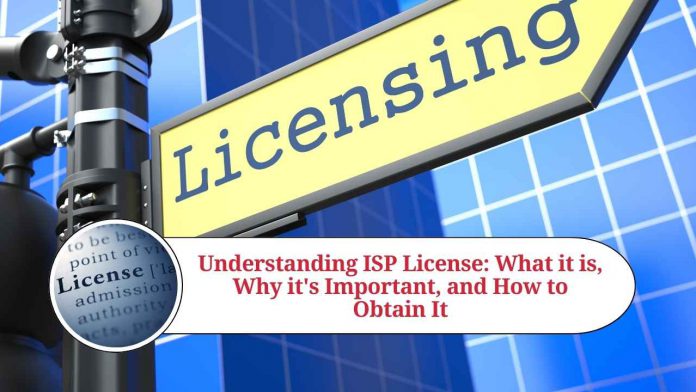ISP License: Everything You Need to Know
An Internet Service Provider (ISP) License is a legal permit that allows a company or organization to offer internet services to customers. This license is issued by the regulatory authorities of the country where the ISP operates. In this blog post, we will discuss everything you need to know about ISP licenses, including the requirements, the application process, and the benefits of obtaining an ISP license.
What is an ISP License?
An ISP License is a legal permit that allows a company or organization to offer internet services to customers. It authorizes the licensee to operate as an ISP and provide internet services such as broadband, wireless, and dial-up connectivity, to customers. The license also regulates the ISP’s operations, ensuring compliance with regulations and guidelines.
Why is an ISP License required?
An ISP License is required to operate as an ISP in a particular country. This license ensures that the ISP is operating in compliance with the regulations set by the government. Without an ISP license, an organization cannot offer internet services to customers legally. Operating without a license can result in penalties, fines, or even legal action against the ISP.
ISP License Requirements
The requirements for obtaining an ISP license vary from country to country. However, some common requirements include:
- Proof of legal registration of the ISP company
- Technical expertise and experience in providing internet services
- Adequate financial resources to operate as an ISP
- Compliance with legal and regulatory requirements
- Payment of a license fee
ISP License Application Process
The application process for an ISP license also varies from country to country. However, the general steps involved in obtaining an ISP license are:
Step 1: Research the requirements for obtaining an ISP license in the country where you want to operate.
Step 2: Prepare the necessary documents and information required for the application, such as proof of registration, technical expertise, financial resources, and compliance with legal requirements.
Step 3: Submit the application to the regulatory authority in charge of issuing ISP licenses. The application may also include an inspection of the ISP’s technical infrastructure and operations.
Step 4: Once the application is approved, pay the license fee, and obtain the ISP license.
Benefits of Obtaining an ISP License
- Obtaining an ISP License has several benefits, including:
- Legal authorization to operate as an ISP and offer internet services to customers
- Compliance with legal and regulatory requirements, which reduces the risk of legal action or penalties
- Enhanced credibility and trustworthiness of the ISP in the eyes of customers and business partners
- Access to government resources and programs that support ISPs
- Opportunities to expand the ISP’s services and customer base
Obtaining an ISP license is not always an easy process, and there can be several challenges that ISPs may face. Some of these challenges include:
Complex Regulatory Requirements: In some countries, the regulatory requirements for obtaining an ISP license can be complex and challenging to navigate. This can require ISPs to hire legal and regulatory experts to help them through the process.
High License Fees: In some cases, the license fees for obtaining an ISP license can be prohibitively high, making it difficult for small or new ISPs to enter the market.
Technical Infrastructure Requirements: Some countries have stringent technical infrastructure requirements that ISPs must meet to obtain a license. This can require significant investments in hardware and software, which can be a barrier to entry for new ISPs.
Limited Availability: In some countries, the government may limit the number of ISP licenses that it issues, which can create a highly competitive market and limit opportunities for new ISPs.
ISP License Renewal
Once an ISP obtains a license, it is usually valid for a specific period, after which it must be renewed. The renewal process is similar to the application process, and ISPs must provide updated information and documentation to demonstrate their continued compliance with legal and regulatory requirements.
Conclusion
In conclusion, an ISP license is a legal permit that allows organizations to operate as ISPs and offer internet services to customers. Obtaining an ISP license is essential for complying with legal and regulatory requirements, building credibility with customers and business partners, and accessing government resources and programs. While there can be challenges in obtaining an ISP license, such as complex regulatory requirements and high license fees, the benefits of obtaining one are significant. Therefore, it is crucial for any organization that wants to operate as an ISP to understand the requirements and process for obtaining a license and take the necessary steps to do so.
Frequently Asked Questions (FAQs)
What is an ISP license?
An ISP license is a legal permit that allows an organization to offer internet services to customers. It authorizes the licensee to operate as an ISP and provide internet services such as broadband, wireless, and dial-up connectivity to customers.
Why do I need an ISP license?
You need an ISP license to operate as an ISP legally. It ensures that you are complying with regulations set by the government and reduces the risk of penalties or legal action against your organization.
How do I apply for an ISP license?
The application process for an ISP license varies from country to country. Generally, you need to prepare the necessary documents and information required for the application, such as proof of registration, technical expertise, financial resources, and compliance with legal requirements. You then submit the application to the regulatory authority in charge of issuing ISP licenses.
What are the requirements for obtaining an ISP license?
The requirements for obtaining an ISP license vary from country to country. However, some common requirements include proof of legal registration of the ISP company, technical expertise and experience in providing internet services, adequate financial resources to operate as an ISP, compliance with legal and regulatory requirements, and payment of a license fee.
How long does it take to get an ISP license?
The time it takes to get an ISP license varies depending on the country and the regulatory authority involved. Generally, the process can take several weeks to a few months.
What is the validity period of an ISP license?
The validity period of an ISP license varies depending on the country and regulatory authority. Usually, it is valid for a specific period, after which it must be renewed.
How much does an ISP license cost?
The cost of an ISP license varies depending on the country and regulatory authority. Generally, it can range from a few hundred dollars to several thousand dollars.
Can I operate as an ISP without a license?
No, you cannot operate as an ISP without a license. Operating without a license can result in penalties, fines, or even legal action against the ISP.
What are the benefits of obtaining an ISP license?
The benefits of obtaining an ISP license include legal authorization to operate as an ISP and offer internet services to customers, compliance with legal and regulatory requirements, enhanced credibility and trustworthiness of the ISP in the eyes of customers and business partners, access to government resources and programs that support ISPs, and opportunities to expand the ISP’s services and customer base.
What challenges may I face in obtaining an ISP license?
Some challenges you may face in obtaining an ISP license include complex regulatory requirements, high license fees, stringent technical infrastructure requirements, and limited availability of licenses in some countries.




















